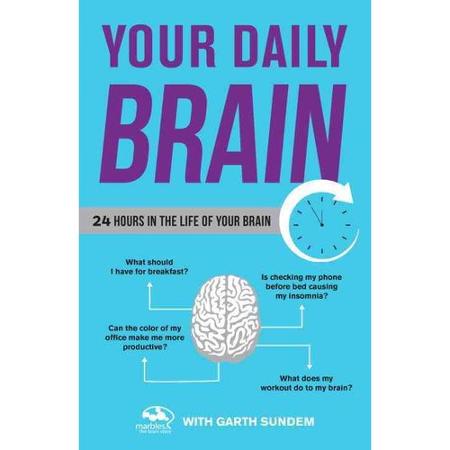 A healthy brain is important and sometimes that means optimizing some things about our lives, even if they seem counter-intuitive.
A healthy brain is important and sometimes that means optimizing some things about our lives, even if they seem counter-intuitive.
Garth Sundem, a featured author on Science 2.0, is here to help. In Your Daily Brain: 24 Hours in the Life of Your Brain and with help from from Marbles: the Brain Store, Sundem provides insight into what exactly is going on in your brain throughout the day starting from the moment your alarm clock goes off to falling asleep at night, and everything in between, from losing your car keys, going to the gym, and interacting with your family.
These daily activities are divided into short chapters filled with information, tips, and tricks on how to make decisions that will best benefit your mental and physical health.
And most importantly, the information the book provides is backed by peer-reviewed scientific research.
Just a few examples:
In the morning: Here s what your brain likes for breakfast
Research has found that kids who ate low-glycemic-index breakfasts had higher gray matter volumes and even higher overalls IQs than kids who ate high-glycemic index diets. Additionally, FDA-approved clinical trials have shown that prescribing breakfast helps promote weight loss, because it helps you resist snacking throughout the day.
In the afternoon: How to step up, not fade away, in the face of workplace stress
First, it s well known that chronic stress is bad for your health The Mayo Clinic notes that chronic stress puts you at higher risk for anxiety, depression, weight gain, heart disease, sleep problems, and much more. However, a little stress (what researchers call acute stress) can be good for your productivity. A perceived level of stress between 40 and 48 (out of 100) has been found to predict the highest performance in the workplace.
In the evening: Does your brain like one drink a day?
The source of the belief that moderate drinking can be beneficial to your health can be traced back to a 1988 study published in the New England Journal of Medicine that found Among middle-aged women, moderate alcohol consumption decreases the risks of coronary heart disease and ischemic stroke. Moderate drinking has also been shown to reduce stress and cut clinical depression risk. However, beyond one drink per day, the health benefits of alcohol take a plunge off a steep cliff.
Your Daily Brain is a quick, enlightening, and engaging read for anyone interested in discovering how to brain hack their way into making better choices throughout the day (should you be checking your phone right before bed?), or anyone simply curious to find out more about how the mind works.


